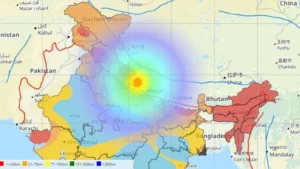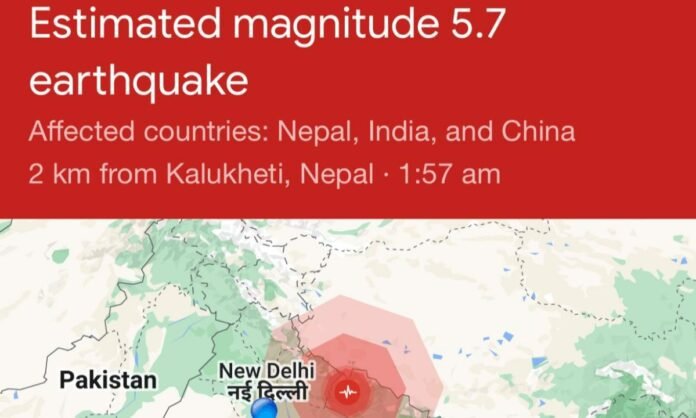There was an earthquake today and people in Delhi-NCR felt shaking. More information is needed.
2 min read 2024-01-12, 12:00 AM IST
Summary of the content
- Date and Location: Earthquake struck Afghanistan on January 11, 2024. Epicenter 241 km northeast of Kabul.
- Magnitude and Depth: Magnitude: 6.1 on the Richter scale. Depth 220 km below the Earth’s surface.
- Impact on South Asia: Tremors felt in Delhi, Lahore, Islamabad, and Khyber Pakhtunkhwa. Quake also affected Punjab’s Sargodha, Khushab, Mandi Bahauddin, Bhakkar, Nowshera, and Muzaffarabad in Pakistan-occupied Kashmir.
- US Geological Survey Data: Recorded quake at 6.4 magnitude with an epicenter 44 km SSW of Jurm in Afghanistan. Depth: 206.6 km.
- No Immediate Reports of Casualties: Despite the intensity, no reports of loss of life or significant property damage.
- Pakistan Meteorological Department’s Information: Registered earthquake at 6.0 magnitude in the Hindu Kush region. Occurred at 2:20 pm local time at a depth of 213 km.
- Seismic History of the Region: Pakistan is in a seismically active zone, experiencing frequent earthquakes. Reminds of the devastating earthquake in October 2005 that claimed over 74,000 lives.
- Chief Meteorologist’s Warning: Chief Meteorologist at PMD, Sardar Sarfaraz, warns of possible aftershocks due to high quake intensity. Draws a parallel to Japan’s experience with aftershocks after a powerful earthquake on January 1.
- Preparedness and Response: Emphasizes the need for proactive measures, including earthquake-resistant building codes. Calls for public awareness campaigns and drills to educate citizens on safety measures during earthquakes.
- International Cooperation: Stresses the importance of international cooperation in earthquake preparedness and response. Collaboration for sharing knowledge, expertise, and resources is crucial.

On Thursday, January 11, 2024, a seismic event originating in Afghanistan sent shockwaves through South Asia, particularly affecting Delhi in India and various cities in Pakistan. The earthquake, measuring 6.1 on the Richter scale, had its epicenter located 241 kilometers northeast of Kabul. The National Center for Seismology reported the incident, highlighting the depth of the quake at 220 km. Luckily, there has been no news of anyone getting hurt or of any major damage to buildings.
ALSO READ| Earthquake Today.
Details of the Earthquake
The earthquake, with a magnitude of 6.1, occurred at 14:50:24 IST on January 11, 2024. The specific coordinates provided by the National Center for Seismology were latitude 36.48 and longitude 70.45. The depth of the earthquake was measured at 220 km. The seismic event was a result of tectonic activity in the region, a common occurrence given Afghanistan’s location within a seismically active zone.
ALSO READ| Earthquake shocks Delhi-NCR.
Impact on Afghanistan and Surrounding Regions
The quake’s impact extended beyond Afghanistan, reaching neighboring countries such as Pakistan. Cities like Lahore, Islamabad, and Khyber Pakhtunkhwa experienced strong tremors. The United States Geological Survey recorded the earthquake at a depth of 206.6 km, with the epicenter located 44 km SSW of Jurm in Afghanistan at 2:50 pm.
In Pakistan, the earthquake registered at 6.0 on the Richter scale, striking the Hindu Kush region at a depth of 213 km at 2:20 pm local time. Affected areas included Punjab’s Sargodha, Khushab, Mandi Bahauddin, Bhakkar, Nowshera, and Pakistan-occupied Kashmir’s Muzaffarabad. Despite the intensity of the earthquake, there have been no immediate reports of casualties or significant damage.
ALSO READ| Earthquake Strikes Japan; A Nation Grapples with Devastation and Resilience.
Seismic History of the Region
Pakistan is situated in a seismic region known for its frequent earthquakes and tremors of varying intensity. The Chief Meteorologist at the Pakistan Meteorological Department, Sardar Sarfaraz, noted the likelihood of aftershocks due to the high intensity of the earthquake. Drawing a parallel to Japan’s experience with aftershocks after a powerful earthquake on January 1, he emphasized the need for preparedness in the region.
Comparisons with Past Earthquakes
The seismic history of the region includes the devastating earthquake that struck Pakistan in October 2005, claiming the lives of over 74,000 people and causing widespread destruction. This tragic event serves as a reminder of the region’s vulnerability to seismic activity and the importance of proactive measures to mitigate the impact of earthquakes.
Preparedness and Response
Given the seismic nature of the region, it is crucial for governments and communities to be prepared for earthquakes. Authorities should implement and enforce building codes that prioritize earthquake-resistant structures to minimize casualties and property damage. Additionally, public awareness campaigns and drills can help educate citizens on safety measures during seismic events.
International Cooperation
Seismic events do not adhere to geopolitical boundaries, and international cooperation is essential in developing a comprehensive approach to earthquake preparedness and response. Sharing knowledge, expertise, and resources can contribute to the development of effective strategies for mitigating the impact of earthquakes in seismically active regions.
Conclusion
The recent earthquake in Afghanistan, reverberating through South Asia, serves as a stark reminder of the unpredictable nature of seismic activity. While immediate reports indicate no significant loss of life or property, the region must remain vigilant and proactive in earthquake preparedness. Governments, communities, and international organizations should collaborate to enhance resilience and reduce the impact of future seismic events in this seismically active part of the world.

